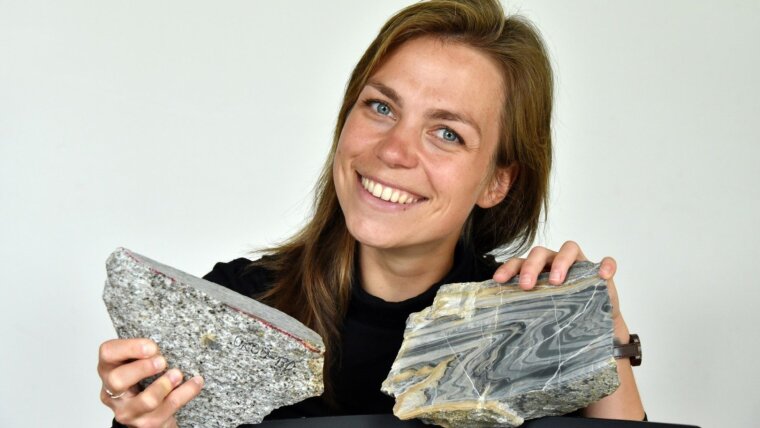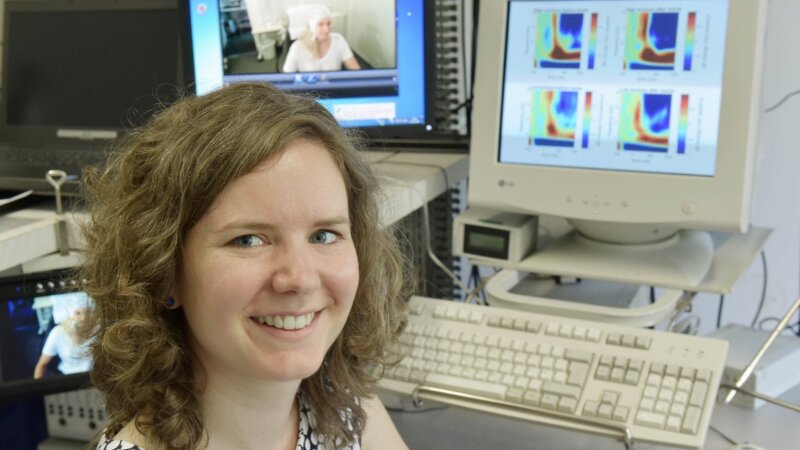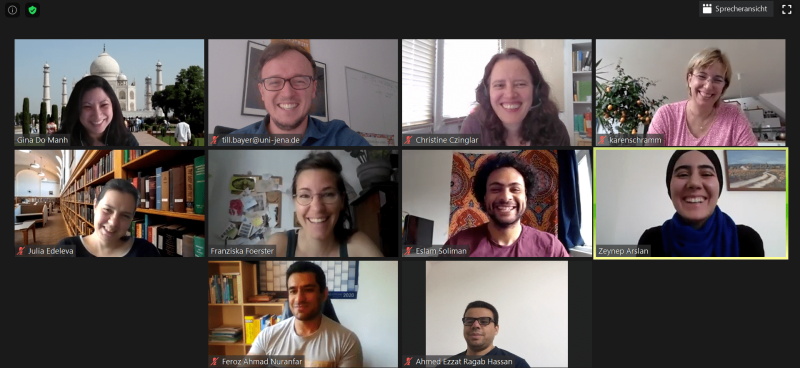
Due to the coronavirus pandemic, most of the 2020 summer semester at the University of Jena took place online. In teaching, events moved from the lecture halls and seminar rooms to virtual learning platforms and video conferences. Research was equally affected by the pandemic: Analogue meetings and excursions were cancelled, and hygiene regulations severely restricted laboratory work. Three research projects from disciplines as varied as German as a foreign and second language, clinical psychology and structural geology also had to change and adapt. Their examples show that the crisis was accompanied by setbacks and at the same time opened up space for new ideas.
Even through the small window of the video chat program, one can see Madeline Richter’s passion for her field of research. The young doctoral student from the Department of Structural Geology at the University of Jena beams with her entire face when she talks about being a »rock smasher«, moving through the terrain with a map and a compass. But soon, disappointment is mixed into her voice. Coronavirus has thwarted her research project. Richter, who is sitting at her desk in her Jena apartment looking into the camera, would literally rather be on the other side of the world than giving an interview to LICHTGEDANKEN. She actually wanted to fly to Taiwan in the summer semester to explore the Yuli Belt in the central mountains there. She is particularly interested in the deformation history of the mountains, which offers geologists a globally unique laboratory: Two tectonic plates, the Eurasian and the Philippine, slide over each other there and push relatively young rocks from high depths of the earth’s crust – so-called metamorphic rocks – to the surface.
Richter is on the trail of the how and the why of this phenomenon. In order to find out more about it, she wanted to collect samples on site and carry out measurements. However, when she began her doctorate in March 2020, it became clear that she would not be able to undertake the research trip that was scheduled for two months later due to the global spread of the virus – especially since Taiwan imposed strict entry requirements from an early stage. »We were getting updates about the COVID-19 situation every day and we had to make a decision«, she recalls. »So we postponed the trip provisionally until November.« An earlier date would have been impossible, not just because of the pandemic: When hurricanes don’t hit the East Asian island state in summer, the extreme heat ensures that field research could only be carried out with the greatest effort.
Research at the desk at home instead of field studies
The postponement causes numerous disadvantages for Madeline Richter: She can no longer advance the theory and practice of her research in parallel as planned. In addition, the DFG-funded project [German research funding organisation], which runs until 2023 and in which researchers from Taiwan and the University of Bonn also participate, will have to be funded for another six months. What is more, another geology doctoral student from Jena, who comes from mainland China, can no longer help her find her way around the far away country. While Richter’s patience is put to the test, her colleague’s contract expires.
For the time being, she has no choice but to read scientific studies on the subject from home and do the necessary preparatory work. She now has more time to study various analytical methods she uses to determine the properties of metamorphic rocks, such as their crystallographic structure. But without field studies, all research efforts remain incomplete: »You have to be able to see and touch the material and to develop a spatial idea of it to do really good work,« explains the geologist. »It would not be enough to have the samples sent to you via mail and then to analyse them in the laboratory here in Jena.«
But it’s not just the schedule that’s upset now, the unexpected situation is also affecting the mood, confesses Madeline Richter. She considers field research to be one of her strengths; both professionally and in her free time, she likes to be out in nature. Accordingly motivated, she wanted to get off to the right start with the Taiwan trip in her doctorate. Now she sometimes finds it difficult to keep her chin up. Still, it looks like she will be able to complete the field study in Taiwan in November as planned. And there is another ray of hope: Her doctoral supervisor, Prof. Dr. Kamil Ustaszewski, will probably be able to accompany her for two weeks.
Psychologist Dr Barbara Schmidt is conducting hypnosis experiments online.
Image: Jan-Peter Kasper (University of Jena)On-site laboratory experiment converted into online test
Dr Barbara Schmidt usually conducts her research in the building of the Institute of Psychology at the University of Jena, an imposing half-timbered building at the foot of the Landgrafen hill. If you take the stairs up to the second floor, you first have to ring the bell at a locked door equipped with security cameras before you can enter the laboratory. Once there, one looks at a series of screens and bulky apparatus arranged next to and on top of each other. Behind them is the heart of the laboratory: a windowless chamber with two doors and a single chair inside. Here, Schmidt uses an electroencephalogram (EEG) to investigate what happens in the human brain during hypnosis. She wants to learn more about this special state of consciousness, not least because it can improve quality of life in many ways: Hypnosis can take away fears, treat depression or help to stop smoking.
In her latest study, Schmidt wanted to use the EEG laboratory for another experiment. She wants to show that hypnosis can increase the human memory capacity. But then the coronavirus pandemic thwarted her plans too. Without a hygiene concept, she was unable to use the laboratory from March onwards. For the EEG, the participants have to be prepared with the EEG setup in the small chamber and the minimum distance of 1.5 metres is hard to be maintained. So, she decided to redesign the study from scratch and conduct the experiment online.
The result is a new online test for which the participants no longer have to come to Schmidt at the institute, but can complete the test at home. It begins with an audio hypnosis, during which the test subjects write an »E« for the German verb to remember and a »K« for the German word for control on one piece of paper each. Afterwards, the participants learn word lists, whereby they must remember individual terms presented on the screen. During the actual memory test, i.e. the recognition of the words learned, the »E« note serves as a trigger for easier remembering, while the »K« note in the control condition stands for normal remembering. The improved memory performance is then measured as the difference between the »E« and »K« conditions. In another session one week later, participants are tested once more to see if the results are stable over time.
Video interview about hypnosis research at a distance:
placeholder image — Stylized representation of a film projector
Graphic: FreepikHypnosis requires trust – even at a distance
In order to design the test, Schmidt not only had to find a suitable program and adapt it to the test conditions, but also to record the hypnosis text itself. In the recording, she speaks with a clear and reassuring voice: »Just as you, after learning to read as a child, now see words and read automatically, you now easily remember things learned automatically.« Such audio hypnosis is not unusual. It can be applied, for example, in intensive care medicine, where it is used to improve the well-being of patients or to alleviate pain.
But does hypnosis also work reliably at a distance? »With hypnosis, it is crucial that the participants get involved and trust the hypnotist«, explains Schmidt. »Only in this way can they reach a hypnotic state in which they are prepared to let things go.« In particular, Schmidt can no longer control this involvement in hypnosis with the new online test – unlike in the laboratory. That is why she has only invited participants she already knows from previous studies. A further disadvantage: Although it is possible to determine memory performance relatively reliably online, it is not possible to measure EEG as a neuronal measure of memory. »On the other hand, participants can now participate at the same time and the laboratory does not have to be booked separately,« Schmidt says, listing the advantages. »In addition, I have much less work overall because I don’t have to be present at every hypnosis session.«
Barbara Schmidt is now looking forward to the results. Initial feedback from participants already shows that hypnosis also works well at home, which makes Schmidt very hopeful. It is conceivable that the study could be extended to include people who have not yet had any contact with hypnosis, which would drastically expand the possibilities for data collection. Thus, the step to the online study was involuntary at first, but it opens up new promising perspectives for the future. »I have left my comfort zone and now I am positively surprised about my new possibilities. This process is in a way similar to engaging with hypnosis, where you discover new resources within yourself.«
The mood is good at the meetings of the ELIKASA research project, held online due to the coronavirus.
Screenshot: Till BayerFor Julia Edeleva and Zeynep Arslan, the coronavirus crisis did not change much at first glance. In contrast to Madeline Richter and Barbara Schmidt, the two Jena linguists from the field of German as a foreign and second language are not dependent on laboratory capacities and, at present, not necessarily on research trips. In their ELIKASA research project, they are developing various instruments – for example, language tests – with which the learning progress of adults who learn to read and write German as a second language can be recorded. To do this, they are working together with language researchers from several universities in Germany. These researchers are not only experts in languages with origins such as Arabic, Turkish or Farsi, but also know how to implement contrastive literacy courses based on a comparison between German and the languages of origin.
The coronavirus has not changed this research work in terms of content, but in terms of organisation: When the team started work in April, the first coronavirus-related restrictions were coming into effect. The group was unable to meet for an opening meeting as planned. At the same time, the entire scientific community increasingly shifted to working from home and various online tools for video conferencing and group work gained in importance. So the team around Prof. Dr. Christine Czinglar from the University of Jena decided to move the project into virtual space as far as possible. Instead of simply exchanging information via e-mail, the project group now works together permanently on a virtual platform and meets at least once a week via video conference.
The eight-member group also meets online on a Friday morning in July: Around nine o’clock in the virtual meeting room, small windows gradually open from which the team members greet each other. They are all working from home – in Jena, Leipzig, Berlin and other cities. Some sit in front of bookshelves in their private office or living room. A landscape panting hangs in the background behind Zeynep Arslan. Julia Edeleva has chosen a virtual library motif that the software makes available.
Undoubtedly, communication from home makes more private things visible – and also audible, as the subsequent presentation of a test sheet to test learning strategies shows: In the middle of the presentation, a loud croak suddenly sounds. It is the speaker’s parrot, which is in the same room as her. The feathered troublemaker causes a lot of laughter. Everyone shows understanding – although the meeting follows a tight schedule. »It is a great advantage that many of us met in person before the crisis and that we trust each other«, explains Julia Edeleva. »This makes digital collaboration much easier.« In fact, there is no further interruption after the parrot has calmed down again. The tone remains friendly, the working atmosphere relaxed.
Good organisation is the key
Zeynep Arslan, who will be moderating the meeting, will take care of the latter. She not only has to follow the presentation attentively, but also collect questions that come in parallel in the group chat: »Where in the test can the number ›90‹ be meaningfully placed? Should numbers be asked at all?« Arslan calls up all questioners one after the other at the appropriate time. Usually a small discussion develops, in which the team quickly agrees on a solution. Only one person speaks at a time; the other microphones remain muted.
»Working online in a larger group only works if there is good organisation«, says Julia Edeleva, who coordinates various working groups in the team. The team has self-organised and tested suitable tools: The »Teams« software has proven its worth because of the possibilities for jointly editing and saving documents for internal communication, and the team uses »Zoom« for external meetings. Edeleva sees an advantage of video conferences in the fact that external experts can be quickly and easily called in who would otherwise only provide written feedback. This Friday, for example, Prof. Dr. Karen Schramm from Vienna will be present.
Julia Edeleva is convinced that this positive experience will make it easier in the future to cooperate with project partners from far away. Even if the restrictions due to coronavirus are completely lifted, part of the digital research work will remain. And yet: The entire team can hardly wait to finally see their colleagues not only on the computer screen. And when the participants of the literacy courses are soon to be tested, travel will become inevitable – the team currently has to live with this uncertainty in planning.
By Till Bayer

